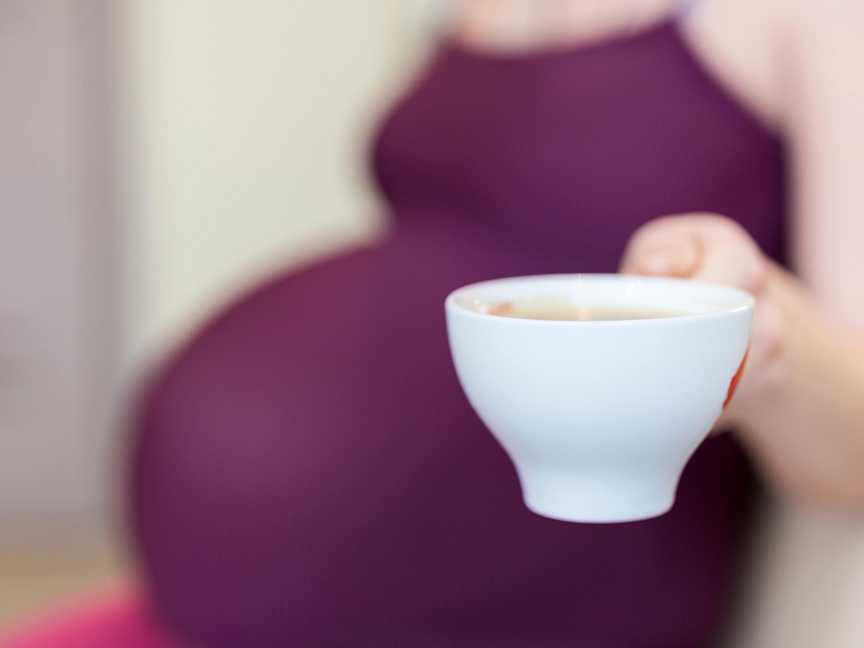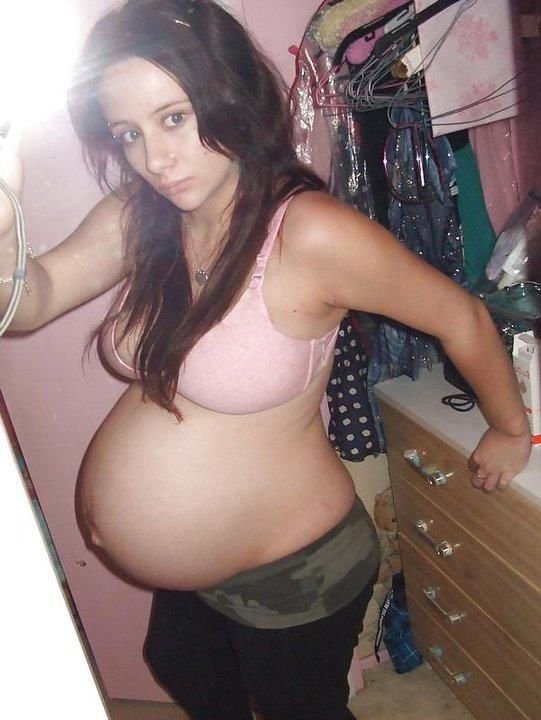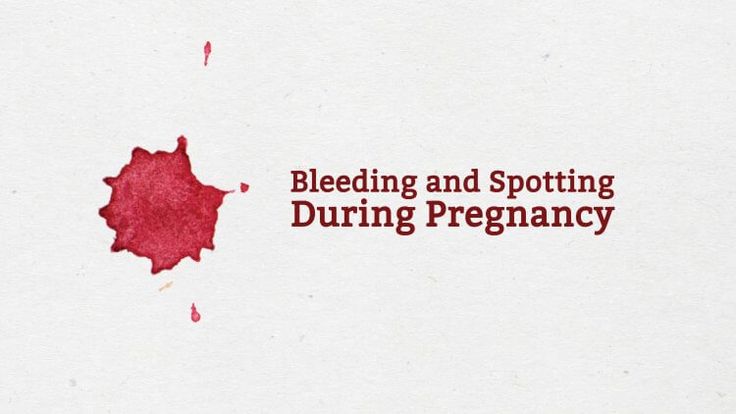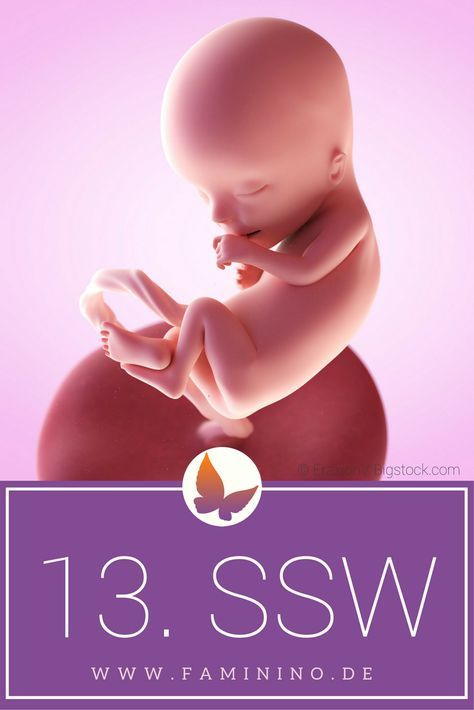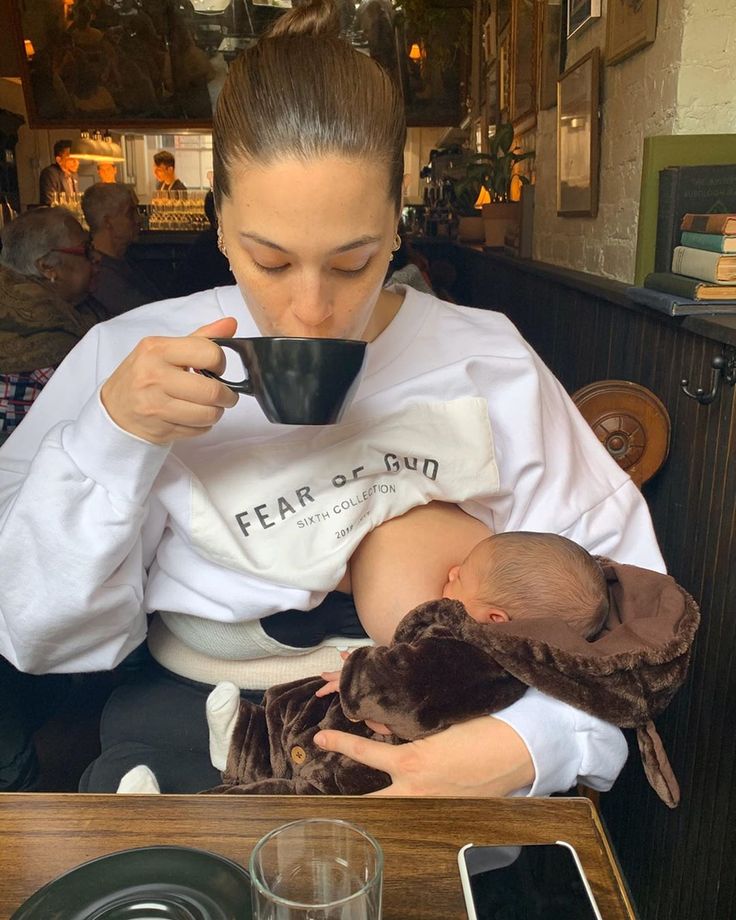Tea and coffee during pregnancy
Is Tea Safe During Pregnancy?
Tea is one of the most popular beverages worldwide — and one that many women continue to enjoy during pregnancy.
Some drink it to simply decompress or help meet the increased fluid needs of pregnancy. However, a proportion of women appear to use tea as a natural remedy for pregnancy-related symptoms or as a tonic to prepare for childbirth in the last weeks of pregnancy (1).
Many may believe that tea is probably safe to drink while pregnant because it’s natural. In reality, women may benefit from reducing their intake of certain teas, while completely avoiding others throughout their pregnancy.
This article discusses the safety of tea during pregnancy, including which teas pregnant women may continue to drink, and which they may want to avoid.
Black, green, white, matcha, chai, and oolong teas are all sourced from the leaves of the Camellia sinensis plant. They contain caffeine — a natural stimulant that should be limited during pregnancy.
They each provide approximately the following amount of caffeine per cup (240 mL) (2, 3, 4, 5, 6):
- matcha: 60–80 mg
- oolong tea: 38–58 mg
- black tea: 47–53 mg
- chai: 47–53 mg
- white tea: 25–50 mg
- green tea: 29–49 mg
Caffeine can easily cross the placenta, and your baby’s immature liver has difficulty breaking it down. As such, infants are more likely to experience side effects from amounts of caffeine that would otherwise be considered safe for adults.
Research suggests that infants exposed to too much caffeine during pregnancy may have a higher risk of being born preterm or with a low birth weight or birth defects. High caffeine intake during pregnancy may also increase the risk of miscarriage or stillbirth (7, 8, 9).
These risks appear minimal when pregnant women limit their caffeine intake to a maximum of 300 mg per day (8).
However, some women’s genetics may make them more sensitive to the ill effects of caffeine. For instance, research suggests that this small proportion of women may have a 2.4 times higher risk of miscarriage when consuming 100–300 mg of caffeine per day (8).
Caffeinated teas contain less caffeine than coffee and are generally considered safe to drink during pregnancy. However, their intake may need to be limited to avoid consuming too much caffeine per day (10, 11).
summaryBlack, green, matcha, oolong, white, and chai teas contain caffeine, a stimulant that should be limited during pregnancy. Although they’re generally safe, women may benefit from limiting their daily intake of these caffeinated teas during pregnancy.
Herbal teas are made from dried fruits, flowers, spices, or herbs and therefore contain no caffeine. However, they may contain other compounds considered unsafe during pregnancy, which may result in risky side effects.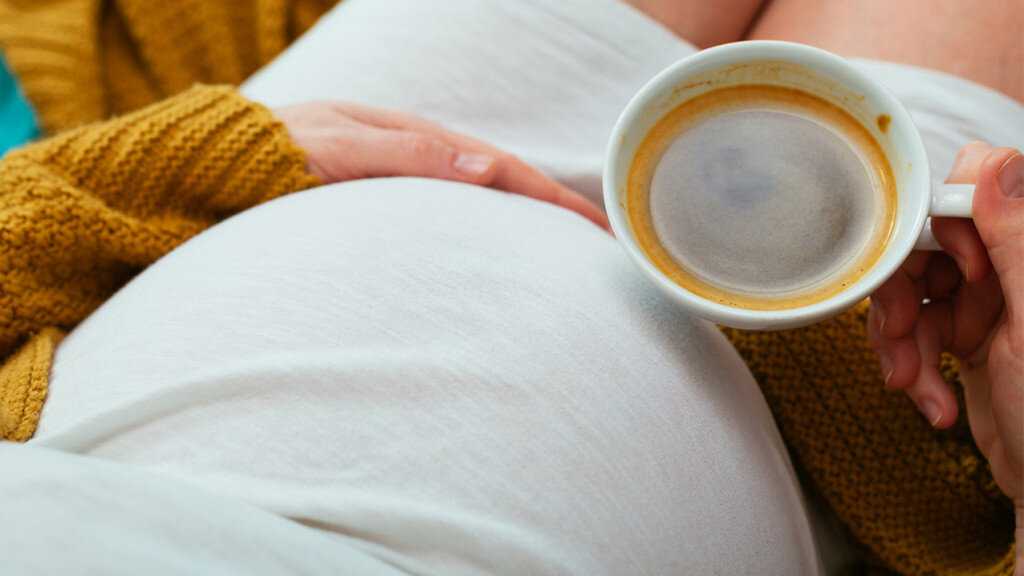
Miscarriage or preterm labor
Teas that may increase your risk of miscarriage or preterm labor include (11, 12, 13, 14, 15):
- fennel
- fenugreek
- sage
- vervain
- borage
- pennyroyal
- licorice
- thyme
- motherwort
- lovage
- blue cohosh
- black cohosh
- frankincense (in large amounts)
- chamomile (in large amounts)
Teas that may stimulate or increase menstrual bleeding include (12, 16, 17):
- motherwort
- lovage
- frankincense
Birth defects
Teas that may increase the risk of birth defects include (12):
- motherwort
- borage
Other side effects
Moreover, in rare cases, eucalyptus tea may cause nausea, vomiting, or diarrhea. What’s more, a case report suggests that regularly drinking chamomile tea during pregnancy may result in poor blood flow through a baby’s heart (1, 12).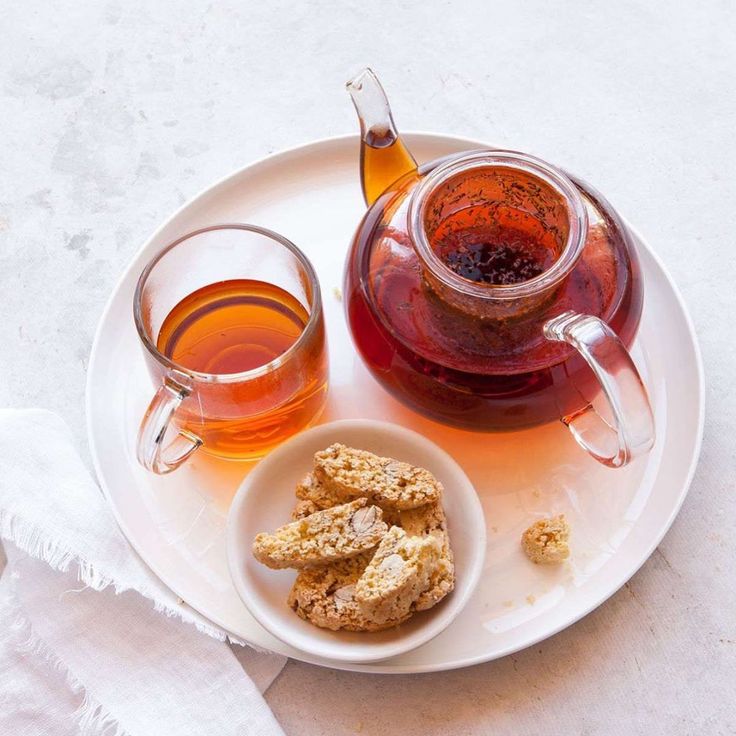
Certain herbal teas may also contain compounds that interact with medications. Therefore, pregnant women should inform their healthcare providers of any herbal teas they are currently consuming or planning on consuming at any time during pregnancy (1).
Keep in mind that, due to the limited amount of research on the safety of herbal teas, a lack of evidence of negative side effects shouldn’t be seen as proof that the tea is safe to drink during pregnancy.
Until more is known, it may be best for pregnant women to remain cautious and avoid drinking any teas that have not yet been shown to be likely safe during pregnancy (18).
summaryCertain herbal teas may be linked to a higher risk of upset stomach, menstrual bleeding, miscarriage, birth defects, or preterm birth. Pregnant women may benefit from avoiding all teas not yet deemed as likely safe for pregnancy.
Teas are not strictly tested or regulated. This means that women may be inadvertently drinking teas contaminated with unwanted compounds, such as heavy metals (19, 20).
For instance, one study tested common off-the-shelf black, green, white, and oolong teas. It found that 20% of all samples were contaminated with aluminum. Moreover, 73% of all samples contained lead levels considered unsafe during pregnancy (21).
In another study, women with the highest intake of green and herbal teas during the first trimester of pregnancy had 6–14% higher blood lead levels than those who drank the least. That said, all blood lead levels remained within the normal range (20).
Due to the lack of regulation, there’s also a risk of herbal teas containing ingredients not listed on the label. This increases the risk that pregnant women end up inadvertently consuming a tea tainted with an undesirable herb, such as the ones listed above.
It’s currently impossible to eliminate this risk. However, you may somewhat minimize it by only purchasing teas from reputable brands.
What’s more, it’s likely best to avoid purchasing teas in bulk, as they have a higher risk of becoming mixed with tea leaves that may be contraindicated during pregnancy from adjacent bulk bins.
summaryThe manufacturing of teas is not regulated. As a result, teas may become tainted with unwanted compounds, such as heavy metals or herbs that have been linked to poor pregnancy outcomes.
Most caffeinated teas are considered safe to drink during pregnancy, as long as they do not cause a woman’s total daily caffeine intake to exceed 300 mg (8, 11).
Women who are particularly sensitive to caffeine may benefit from aiming for a maximum of 100 mg of caffeine per day (8).
When it comes to herbal teas, there’s not a lot of research regarding their effects during pregnancy. As such, most health professionals advise pregnant women to avoid consuming any herb in amounts greater than you would find in foods (1, 12, 18).
That said, according to a few studies, herbal teas containing the following ingredients may be safe to consume during pregnancy:
- Raspberry leaf. This tea is considered likely safe and believed to shorten labor and help prepare the uterus for birth.
 Research shows that it may shorten the length of the second stage of labor, but only by about 10 minutes (11, 22).
Research shows that it may shorten the length of the second stage of labor, but only by about 10 minutes (11, 22). - Peppermint. This tea is considered likely safe and commonly used to help relieve gas, nausea, stomach pain, or heartburn. However, no studies could be found to support these benefits (12).
- Ginger. Ginger is one of the most studied herb remedies during pregnancy and considered possibly safe. Research suggests it reduces nausea and vomiting but, when consumed dried, should not exceed 1 gram per day (1, 12).
- Lemon balm. This tea is considered possibly safe and commonly used to relieve anxiety, irritability, and insomnia. However, no study could be found to support these uses, and its safety hasn’t been studied in pregnancy (11).
Although generally considered safe, raspberry leaf may promote uterine contractions while peppermint may stimulate menstrual flow. Therefore, there’s some controversy regarding whether these teas are safe during the first trimester of pregnancy (12, 23).
Therefore, it may be best to avoid drinking these two teas in the first 12 weeks of pregnancy.
summaryHerbal teas considered to be possibly safe or likely safe during pregnancy include raspberry leaf, peppermint, ginger, and lemon balm teas. However, it may be best to avoid raspberry leaf and peppermint teas in the first trimester of pregnancy.
Despite their widespread popularity, not all teas are deemed safe for pregnancy.
Caffeinated teas like black, green, white, matcha, and chai teas are generally considered safe. However, their intake may need to be limited to avoid ingesting excessive amounts of caffeine.
Most herbal teas should be avoided. Raspberry leaf, peppermint, ginger, and lemon balm tea are the only ones currently deemed as potentially safe. However, women may benefit from avoiding the first two during their first trimester of pregnancy.
Rooibos Tea in Pregnancy: Safety, Benefits, and More
You can’t drink wine, you can’t have a cocktail with your friends, you have to modify your caffeine intake, and now we’re suggesting you can’t have a freaking cup of tea while pregnant? Seriously….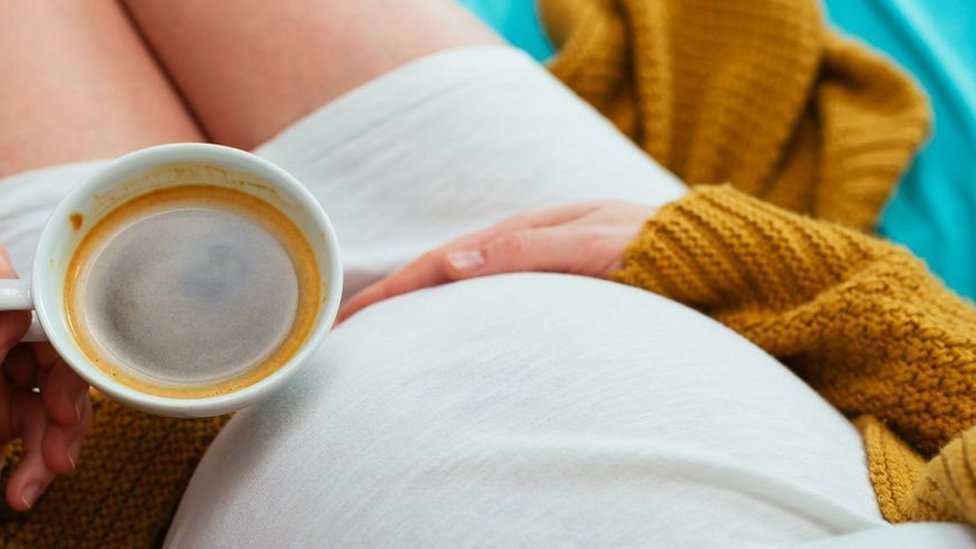 is anything safe?
is anything safe?
Well, yes, actually — several types of tea are just fine during pregnancy, including rooibos.
We get it: When it feels like pretty much everything fun and delicious is off-limits (well, not this fun thing!), even an innocent cup of chamomile or English breakfast starts getting the side-eye.
And it’s true: Just because it’s “botanical” doesn’t make it safe.
But there are actually only a few kinds of teas that are strictly forbidden during pregnancy (like black cohosh and licorice) because of possible side effects.
And thankfully, rooibos isn’t one of them. You can enjoy this flavorful tea while pregnant — and breastfeeding, too — without stressing. Here’s what you need to know.
Rooibos tea is made from dried parts of a plant harvested from the South African red bush shrub. Unlike black and green tea, it isn’t made from tea leaves — so it’s considered an herbal tea.
Among tea aficionados, rooibos gained some popularity in the mid-2000s as a loose leaf alternative to other classic herbals like peppermint, lemon balm, and hibiscus. Plus, it:
Plus, it:
- is caffeine-free
- can be easily mixed with other ingredients to make interesting flavor combinations
- boasts some health benefits
For these reasons, rooibos has made its way into the mainstream world of tea selection.
While you always have to be a little careful with anything herbal during pregnancy, rooibos tea is widely considered to be safe.
In fact, if you need a pick-me-up in the form of a hot bev in a mug (and who doesn’t?), rooibos tea may be ideal; without any caffeine, it’s a better choice than coffee, black tea, or green tea.
Rooibos is also generally considered safe for drinking while breastfeeding. You don’t have to worry about caffeine passing through your bloodstream to your baby, and it will probably help you stay relaxed and calm — so it might even put you in a healthier frame of mind for producing milk.
You should keep in mind, though, that no one really knows how much rooibos is OK. If you’re wanting to drink more than 2 or 3 cups per day, you should talk to your OB-GYN first.
Caffeine during pregnancy
You’ll see us touting caffeine-free hot drink options during pregnancy as good alternatives to coffee and black or green tea, but is caffeine really forbidden?
Not exactly. The American College of Obstetricians and Gynecologists reaffirmed in 2020 that it’s OK to have up to 200 milligrams (mg) of caffeine daily while pregnant. But some people would like to see this guideline revised as a result of a recent analysis suggesting no amount of caffeine is safe in pregnancy.
Our advice is to talk to your doctor about continuing to enjoy your cup of Joe.
The bad news here is that researchers haven’t formally studied the safety of rooibos tea during pregnancy, so there’s no way to give it a ringing endorsement without any caveats.
The only research seems to be one study of pregnant rats. In 2017, researchers reported that rats who were given rooibos tea for 21 days showed no ill effects and, in some cases, experienced effects that might increase fertility.
Fans of rooibos like to tout its beneficial health properties (digestion and skin health and allergy relief, oh my!) — but the research is still pretty light on how good it is for you. Even so, pregnant folks can cross their fingers that their daily cup works to:
- Improve bone health. You need all the strength you can get while pregnant, and it’s possible that rooibos contains a blend of compounds that increases something called “osteoblast activity,” or the development of cells that helps maintain bone mass.
- Supply you with antioxidants. Rooibos has a lot of polyphenols, plant-based nutrients that contain antioxidants and anti-inflammatory properties. Antioxidants decrease the amount of free radicals in your body, aka nasty compounds that can make you sick (in the form of cancer and heart disease, among other conditions).
- Improve your cholesterol. Drinking rooibos tea may reduce your LDL (“bad”) cholesterol and improve your overall heart health.

But we’ll be honest: Even drinking a cup every single day probably won’t do much in these areas.
If you’re a tea junkie who happens to be pregnant, you’ll be happy to hear that rooibos isn’t even the only tea you’re allowed to drink for the next 9 months. If you manage your caffeine intake and keep it below 200 mg daily, even black and green tea are probably OK to consume.
And the following caffeine-free herbal teas typically get a thumbs-up, too:
- ginger (also good for morning sickness!)
- raspberry leaf
- lemon balm
- peppermint
- chamomile (in moderation)
- dandelion (probably, but you should double-check with your doc)
Rooibos is a tea that needs to be steeped, but you can use hot or cold water depending on what kind of drink you want. Steep it in boiling water, make a pitcher of sun tea or cold-brewed tea, or even steep it and then add frothed milk for a rooibos latte.
As it’s gotten popular, more coffeehouses, online tea vendors, and local shops have added to their selection of rooibos tea, making it pretty easy for you to grab a cup at the drive-thru or stock up on a stash of your own at home.
It’s usually sold as a loose leaf tea, though, not in tea bags — so make sure you have a tea infuser.
If it’s totally safe, why do we advise you check with your doctor about rooibos tea? In a nutshell, anything labeled as “herbal” isn’t really strictly regulated, and it’s a good idea to run it by your doctor during pregnancy.
While the chances of anything bad happening because of a cup of rooibos are slim to none, it’s still a plant-based product, and you should make sure your doctor’s cool with you drinking it.
Rooibos is considered a pregnancy-safe herbal tea and a caffeine-free alternative to coffee, green tea, and black tea. It’s easy to brew at home, hot or cold, and may even give you an extra boost of antioxidants.
Is coffee allowed for pregnant women? - KAPservis
Women are real coffee addicts. Some people like to drink bitter espresso in the morning, while others prefer coffee drinks with milk, such as latte or macchiato.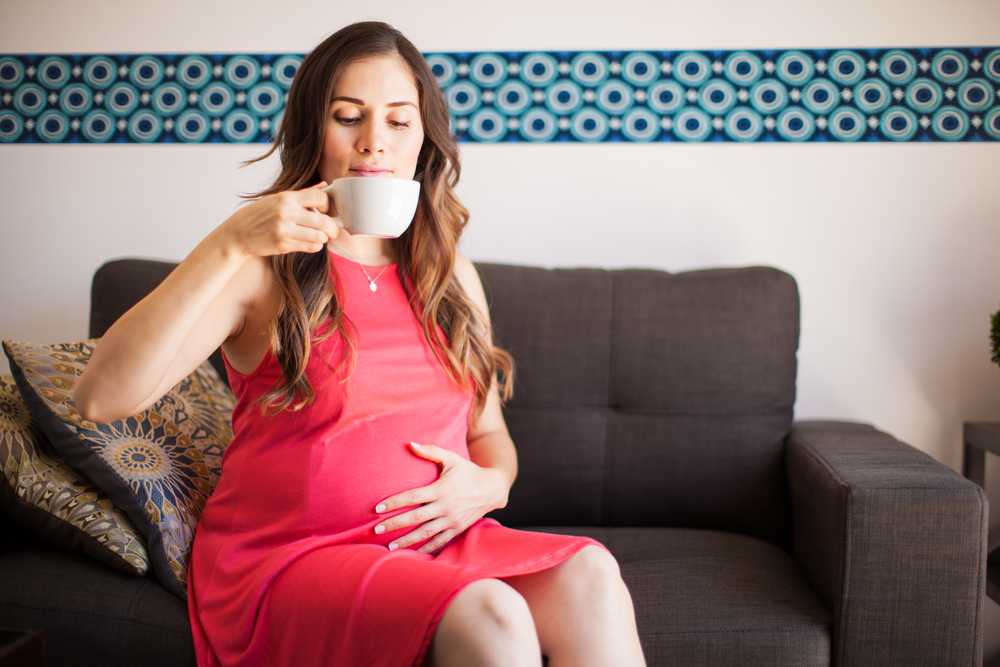 Coffee really helps to cheer up and start work in a good mood. But what to do when you feel sleepy during pregnancy, and everyone around you says that coffee and pregnancy are incompatible. Is it so? And how does coffee coffee actually affect the body of pregnant women?
Coffee really helps to cheer up and start work in a good mood. But what to do when you feel sleepy during pregnancy, and everyone around you says that coffee and pregnancy are incompatible. Is it so? And how does coffee coffee actually affect the body of pregnant women?
Let's try to figure out if pregnant women can drink coffee, in what quantities and if there is a possibility to replace this drink with something.
How much coffee can I take during pregnancy?
Pregnant women and those trying to conceive are advised by doctors to limit their caffeine intake. And this applies not only to coffee, but also to black tea. The American non-profit organization March of Dimes conducted a study during which it turned out that it is possible to drink coffee during pregnancy, but not more than 200 ml per day, which is equal to 1 cup.
Coffee can even be beneficial for pregnant women in small doses. Especially in cases where a woman suffers from low blood pressure. Therefore, a small cup of invigorating elixir will not hurt. For nausea, you can also add a slice of lemon.
Therefore, a small cup of invigorating elixir will not hurt. For nausea, you can also add a slice of lemon.
Where else is caffeine found?
As already noted, caffeine is found not only in coffee, but also in tea. We invite you to read the data, which shows how much caffeine is in some products:
- brewed coffee (200 ml) - 137 mg;
- instant coffee (200 ml) - 76 mg;
- brewed tea (200 ml) - 48 mg;
- tea bags (200 ml) - 26 to 36 mg;
- caffeinated soft drinks (336 ml) - 37 mg;
- chocolate milk (200 ml) - 5-8 mg;
- dark chocolate (in 41 g) - 30 mg;
- milk chocolate (in 43 g) - 11 mg;
- chocolate syrup (1 tablespoon) - 3 mg;
- coffee ice cream - 2 mg.
That is, if you drank a cup of coffee 200 ml, then the consumption of caffeine per day should be limited. But with a cup of tea, you can also eat a few cubes of chocolate.
Why is coffee dangerous for pregnant women?
So, we have already found out how much drink can be consumed per day, but we still have not told about the risks of caffeine use by a pregnant woman.
Excessive coffee consumption during pregnancy can lead to:
Anemia . Tea and coffee contain phenols that interfere with the absorption of iron. According to WHO, from 21% to 80% of pregnant women suffer from iron deficiency anemia, which leads to functional disorders of the systems and organs. And the use of undesirable products only exacerbates the situation.
Insomnia . According to statistics, 78% of pregnant women experience insomnia. Problems can be both physiological (convulsions, hormonal changes, back pain) and psychological (fear of change, fear of childbirth). And since coffee is a stimulant, the sleep situation can worsen even more.
Heartburn . Coffee already stimulates the secretion of stomach acid, which often causes heartburn. During pregnancy, the body needs two to three times longer to clear caffeine.
Coffee already stimulates the secretion of stomach acid, which often causes heartburn. During pregnancy, the body needs two to three times longer to clear caffeine.
Risk of miscarriage . In 2008, media reports circulated that drinking coffee during pregnancy increased the risk of miscarriage. Thus, women who drank more than a cup of the drink a day had a 2-fold increased risk of miscarriage compared to those who did not drink caffeine at all. However, more than one study has been conducted on this subject, and some of them did not catch the connection of coffee with a possible miscarriage at all.
Low weight baby . Some studies have found that high caffeine intake during gestation results in a low birth weight baby. But these data also do not have a scientific evidence base.
Rapid heart rate in a newborn . In babies whose mothers consumed 500 mg of caffeine or more during pregnancy, rapid breathing and heartbeat were recorded. However, in the absence of defects, this disappears a few days after birth.
However, in the absence of defects, this disappears a few days after birth.
What can replace coffee?
If, nevertheless, it was decided that pregnancy and coffee are incompatible, then the logical question arises of what to replace it with. Perhaps the best alternative is chicory, a herbaceous plant with medicinal properties. It has a slight coffee flavor, but does not contain caffeine. If you dream of a good coffee machine, then renting a capsule coffee machine from KAPservis will be exactly the option that you have been looking for!
Listen to your body and, of course, the doctor - and then you and your baby will be healthy!
Share
[TheChamp-Sharing]
Coffee during pregnancy: a complete guide to all the do's and don'ts
When a woman sees "two lines" on her test, her life begins to change that same day. In this life, there are more good habits (timely sleep, proper nutrition, moderate exercise) and less bad habits (alcohol, smoking, sedentary lifestyle, unhealthy food). Coffee as a potentially dangerous product, around which there is a lot of controversy, often falls under the barrier of prohibitions.
Coffee as a potentially dangerous product, around which there is a lot of controversy, often falls under the barrier of prohibitions.
Even without any pregnancy, coffee often raises a number of questions and concerns in people, so the debate around this drink is quite understandable and justified. But our task is to separate myth from reality and figure out when restrictions make sense and when they are a pointless obstacle to a fulfilling joyful lifestyle.
How does coffee affect the body of a pregnant woman?
Before talking about some special effect of coffee on a pregnant woman, let's refresh our memory of what generally happens to us when we drink coffee:
- After caffeine enters the blood, dopamine is released, which, as we remember, is responsible for a good mood. This hormone of joy very willingly “jumps out” in response to a shot of espresso or cappuccino and makes us feel good.
- Under the influence of dopamine, it is easier for us to play sports, we become more enduring and notice less pain in the muscles.
 It also improves overall performance.
It also improves overall performance. - If there is too much caffeine (read - dopamine), the suppression of serotonin production begins. This leads to increased anxiety and can provoke depression.
- In parallel, under the influence of caffeine, adrenaline is released, another hormone that is responsible for our good mood and cheerfulness.
- Increased concentration.
- In most cases, coffee stimulates our heart to beat faster. The rhythm of the heartbeat accelerates and at the same time the pressure rises.
- The theophylline contained in coffee acts on the intercostal muscles and muscles of the diaphragm, as a result of which our breathing becomes more relaxed and easier.
- The excretory systems (diuretic and intestines) are stimulated – under the influence of caffeine, we feel the desire to visit the restroom faster.
- Caffeine also stimulates the nervous system. The peak of this action occurs in the first hour or two after drinking coffee, then for an average of 3-4 hours the breakdown of caffeine in the blood occurs, at which time many people have difficulty falling asleep.
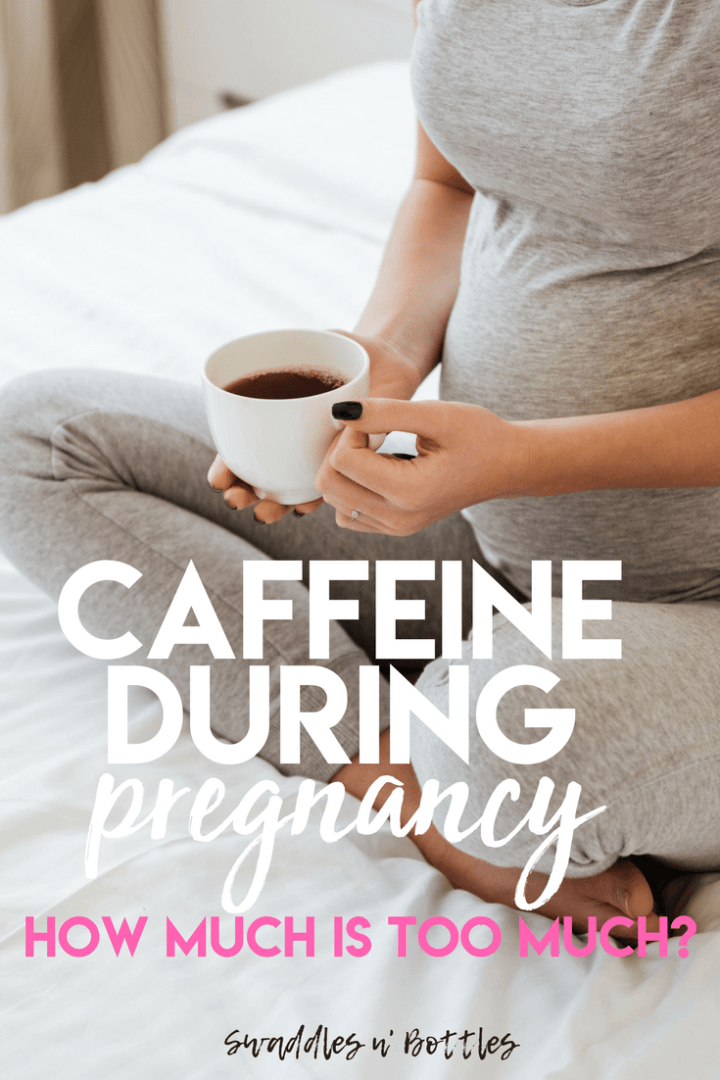
What changes when a pregnant woman drinks coffee? In addition to the above phenomena, the following important parameters should be additionally indicated:
- slows down the process of removing caffeine from the body of a woman;
- increased fetal heart rate;
- increased fetal activity;
- Excessive use creates possible risks for the child.
It is the last item on this list that is cause for concern and doubt about the admissibility of coffee in the diet of a pregnant woman. Below we describe in detail what these risks are and in what cases concerns can be justified.
Can pregnant women drink coffee?
Let's start with a high-profile peer-reviewed study published in the BMJ Evidence-Based Medicine. Professor Jack James from Reykjavik University in Iceland conducted a series of studies in 2020 and concluded that there is no safe level of caffeine intake for pregnant women: even the smallest amount can negatively affect the development of the fetus.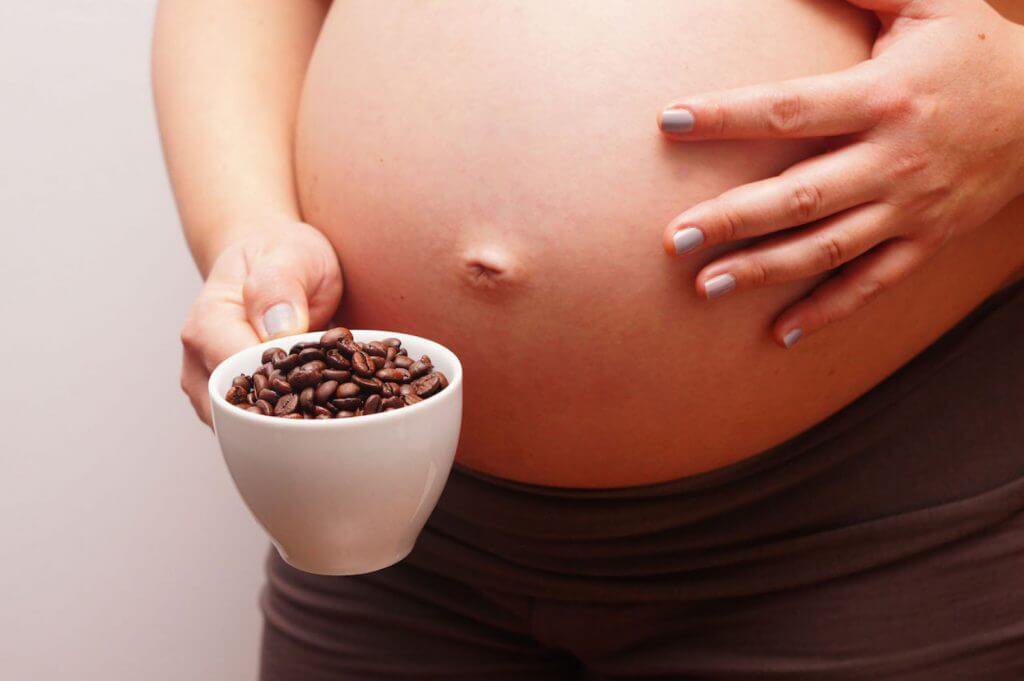 However, Mr. James' colleagues from other countries categorically disagree with him. The National Health Service, the European Food Safety Authority, and the American and British Colleges of Obstetricians and Gynecologists recommend limit but not eliminate caffeine intake during pregnancy . The research paper was deemed "too panicky" and inconsistent with the accepted evidence.
However, Mr. James' colleagues from other countries categorically disagree with him. The National Health Service, the European Food Safety Authority, and the American and British Colleges of Obstetricians and Gynecologists recommend limit but not eliminate caffeine intake during pregnancy . The research paper was deemed "too panicky" and inconsistent with the accepted evidence.
“There are so many do's and don'ts associated with pregnancy, and the last thing we want to do is cause unnecessary worry. After all, women need to be sure that caffeine can be consumed in moderation during pregnancy,” says Dr. Luc Grzeskowiak, a pharmacist at the University of Adelaide in Australia.
Most doctors around the world agree that drinking up to 200 mg of caffeine per day (1-2 cups of coffee) is an acceptable limit that will not harm either mother or child.
Thinking about the amount of caffeine consumed per day, it is very important to remember that it is added not only from your cups of cappuccino, but also from other products (energy drinks, tea, cola, chocolate, cocoa).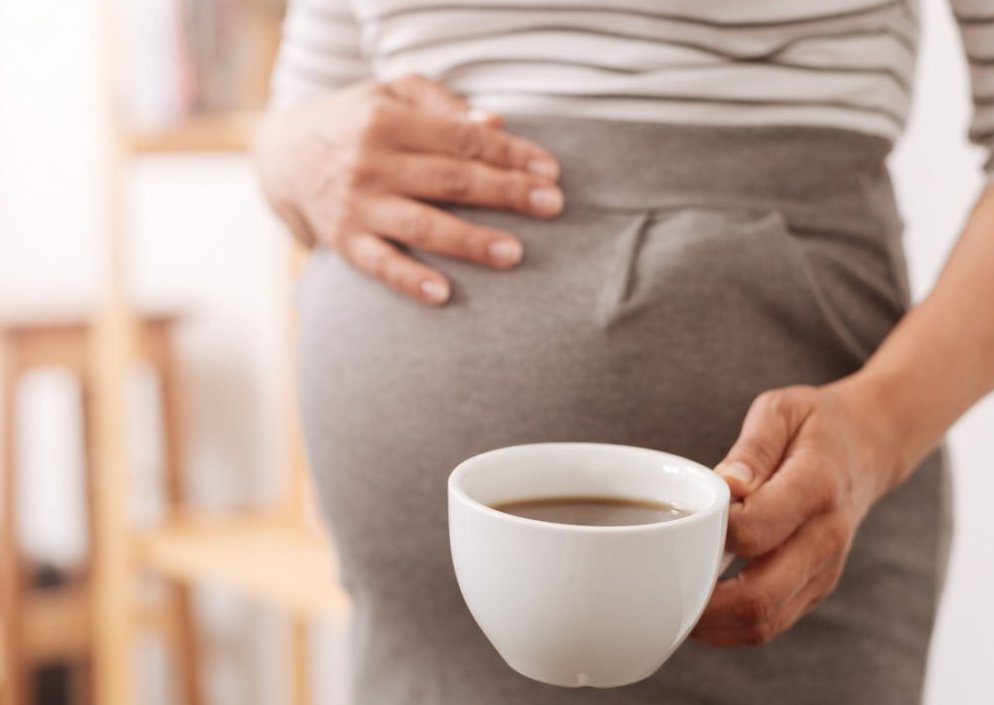
The World Health Organization confirms that excess caffeine consumption may be associated with problems (fetal growth restriction, low birth weight, preterm birth or stillbirth).
Is coffee allowed in early pregnancy (first trimester)?
The first trimester is the time when the foundation of the future life is laid, the most exciting and unpredictable. It is during this period that most miscarriages occur. And if we talk about coffee, then, according to studies, such miscarriages in the early stages are indeed more common in women who drink this drink often and a lot. However no one can say for sure whether high caffeine intake is a threat to the fetus or whether constant coffee consumption is a marker of a failed pregnancy (increased aversion to coffee, along with nausea and vomiting, is a feature of a healthy pregnancy).
Thus, we conclude that for a healthy woman with a healthy pregnancy moderate coffee consumption is quite acceptable .
Can I drink coffee during the second trimester?
The second trimester is the quietest time for a future mother: by this moment the most dangerous milestones have been passed and there is no need to be afraid for the child's viability. Often it is during this period that all those strange and unexpected taste preferences of pregnant women fall, and coffee often becomes such an object of desire. If you do not have strict medical contraindications, you can continue to drink your favorite drink without any worries. The main thing is not to get carried away (remember about 200 mg of caffeine per day). To be completely calm, dilute coffee with milk. To minimize risks, doctors recommend drinking your coffee in the morning.
Is coffee allowed in late pregnancy (3rd trimester)?
The last trimester again increases the risk that the baby will leave the mother's body earlier than necessary, so if you are not sure about your health and the health of the fetus, it is better to reduce coffee consumption to a minimum at this time.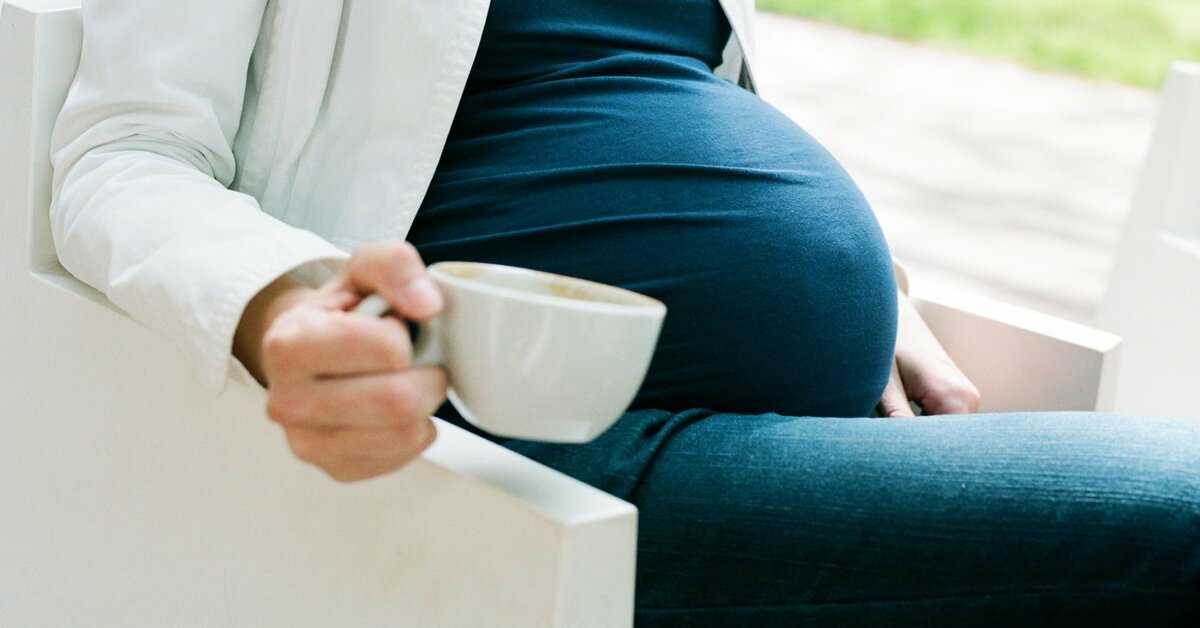 Many studies indicate that in the third trimester of pregnancy, coffee had a negative effect on the condition of the child (premature birth, miscarriage). On the other hand, scientists tend to assume that mothers who drink a lot of coffee in late pregnancy also allow themselves other questionable products (alcohol, tobacco), and this greatly distorts the picture of research.
Many studies indicate that in the third trimester of pregnancy, coffee had a negative effect on the condition of the child (premature birth, miscarriage). On the other hand, scientists tend to assume that mothers who drink a lot of coffee in late pregnancy also allow themselves other questionable products (alcohol, tobacco), and this greatly distorts the picture of research.
Benefits and harms of coffee for pregnant women
As we have already found out, many studies have shown that it is unwise to drink coffee (or in general any drink containing caffeine) during pregnancy in large quantities. Unfortunately, the publication of this information at one time gave rise to a lot of rewritten materials in which it was no longer possible to trace the connection with the original and see the important mention of the amount of caffeine. Meanwhile, in the case of coffee and pregnancy, the most important thing is not to overdo it (as, indeed, in many other areas of our lives).
Benefits of coffee during pregnancy
Coffee has many pleasant and beneficial effects that do not disappear when a pregnant woman drinks it.:strip_icc():format(jpeg):watermark(kly-media-production/assets/images/watermarks/liputan6/watermark-color-square-new.png,45,565,0)/kly-media-production/medias/1961880/original/012351900_1520228839-Ilustrasi_Ibu_Hamil_Minum_Kopi_iStockphoto__2_.jpg) So, for example, coffee for pregnant women with low blood pressure might be a good idea. Thanks to the effect of caffeine, the pressure rises and the well-being of the expectant mother improves.
So, for example, coffee for pregnant women with low blood pressure might be a good idea. Thanks to the effect of caffeine, the pressure rises and the well-being of the expectant mother improves.
Coffee with milk will also benefit pregnant women: it is a good source of calcium, which is so necessary for the harmonious development of the child and maintaining the health of the mother. Latte is an ideal coffee drink during pregnancy: milk takes up more cup volume, which simultaneously reduces the effect of caffeine and replenishes calcium stores.
Coffee is an effective remedy against edema characteristic of pregnant women (diuretic effect).
Do not forget that it is useful for pregnant women to be in a good mood, and coffee certainly helps to lift it.
Harm of coffee during pregnancy
As we remember, there is a version that caffeine consumption during pregnancy can increase the likelihood of infertility, birth defects, miscarriage, stillbirth, premature birth and fetal growth retardation.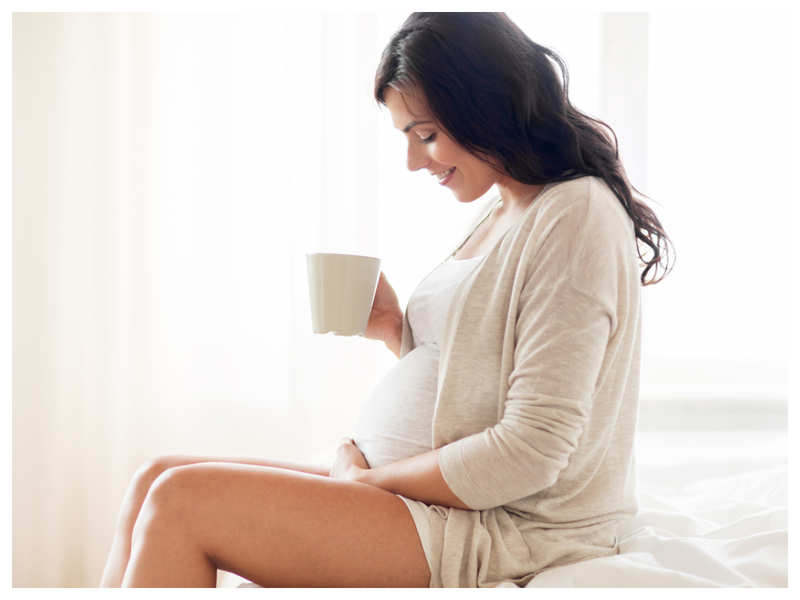 However, this version is not sufficiently proven.
However, this version is not sufficiently proven.
But we know for sure that coffee will be harmful to pregnant women who are prone to hypertension (high blood pressure) and tachycardia (rapid heartbeat), as well as to those who have a lack of calcium, potassium and phosphorus (caffeine slightly contributes to the washing out of these elements). Also, coffee is contraindicated in women with hypertonicity (additional stimulation with caffeine can really cause a miscarriage).
Another unpleasant consequence of pregnant women taking coffee is additional stimulation of the excretory systems. Not a very pleasant thing, given that a woman in position already wants to go to the toilet more often than usual. However, any drink stimulates our kidneys to work more actively, so this is a controversial argument "against".
Which coffee is safer during pregnancy?
If you are not ready to give up coffee, but want to minimize the possible risks, it is worthwhile to figure out in advance which type of coffee is best for you.
Natural bean coffee
Classic coffee made from beans has the highest caffeine content, especially if the coffee is made in Turkish and the blend includes a high percentage of Robusta (this type of coffee has almost twice as much caffeine as Arabica). It is worth drinking no more than one cup a day, and also pay attention to the content of the blend (the ratio of robusta to arabica).
A standard cup of Americano (70 ml.), Espresso (30 ml.) or Cappuccino (180 ml.) contains about 50-70 mg of caffeine (they use the same amount of coffee - 1 shot).
Instant coffee
Instant coffee contains less caffeine in most cases than coffee beans. Doctors believe that a pregnant woman can afford up to two servings of such a drink. 1 teaspoon (without a slide) of instant coffee contains 30–50 mg of caffeine.
Decaffeinated coffee
Perhaps the safest option is for those who value fragrance and ritual more than the effect they produce. In decafe, caffeine is removed by 97-99%, which means that any risks are reduced to almost zero.